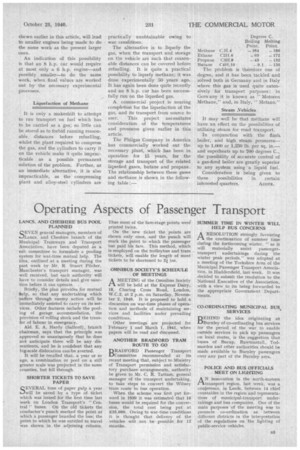Operating Aspects of Passenger Transport
Page 23

If you've noticed an error in this article please click here to report it so we can fix it.
LANCS. AND CHESHIRE BUS POOL PLANNED
SEVEN general managers, members of Lancs. and Cheshire branch of the Municipal Tramways and Transport
Association, have been deputed as a sub committee to formulate a pooling
system for war-time mutual help. The idea, outlined at a meeting during the past week by Mr. R. Stuart Pilcher, Manchester's transport manager, was well received, but each authority will have to consider details and give sanction before it can operate.
Briefly, the plan provides for mutual kelp, so that any undertaking which suffers through enemy action will be immediately assisted to carry on its services. Other features include the pool ing of garage accommodation, the provision of rolling stock and the transfer of labour in emergency.
Aid. E. A. Hardy (Salford), branch chairman, says that the principle was approved so unanimously that he does not anticipate there will be any dissentients, and he is confident that any big-scale dislocation can be averted.
It will be recalled that, a year or so ago, a combination or pool on a still greater scale was projected in the same counties, but fell through.
SHORTER TICKETS TO SAVE PAPER QEVERAL tons of paper pulp a year
will be saved by a type of ticket which was issued for the first time last week on London Transport's "Central " buses. On the old tickets the conductor's punch marked the point at which a passenger boarded the bus; the point to which he was entitled to travel was shown in the adjoining column.
Thus most of the fare-stage points were printed twice.
On the new ticket the 'points are shown only once, and the punch will mark the point to which the passenger has paid his fare. This method, which is employed on the trolleybus and tram tickets, will enable the length of most ' tickets to be shortened to 21 ins.
OMNIBUS SOCIETY'S SCHEDULE OF MEETINGS
AMEETING of the Omnibus Society will be held at the Express Dairy. 18, Charing Cross Road, London, W.C.2, at 2 p.m. on Saturday, November 2, 1940. It is proposed to hold a discussion on war-time phases of operation and methods of maintaining services and facilities under prevailing conditions.
Other meetings are projected for February 1. and March 1, 1941, when papers will be read and discussed.
ANOTHER BRADFORD TRAM ROUTE TO GO
BRADFORD Passenger Transport Committee recommended at its recent meeting that, subject to Ministry of Transport permission and satisfactory purchase arrangements, authority be given to Mr. C. R. Tattam, general manager of the transport undertaking, to take steps to convert the Wibsey tram route to bus operation.
When the scheme was first put forward in 1939 it was estimated that 16 buses would be required for the conversion, the total cost being put at 435,000. Owing to war-time conditions it is thought that delivery of the vehicles will not be possible for 12 months. SUMMER TIME IN WINTER WILL HELP BUS CONCERNS
ARESOLUTION strongly favouring the continuation of summer time during the forthcoming winter, "as it will materially assist passengertransport undertakings during the winter peak periods," was adopted at a meeting of the Yorkshire Area of the Municipal Passenger Transport Association, in Huddersfield, last week. It was decided to submit the resolution to the National Executive of the Association, with a view to its being forwarded to the appropriate Government Departments.
CO-ORDINATING MUNICIPAL BUS. SERVICES BEMND the idea originating at Burnley of co-ordinating bus services for the period of the war to enable outside services to pick up passengers on local routes, is the suggestion that buses of Bacup, Rawtenstall, Todmorden and other authorities should be made available to Burnley passengers over any part of the Burnley area.
POLICE AND BUS OFFICIALS MEET ON LIGHTING
AN innovation in the north-eastern transport region, last week, was a conference, in Leeds, between 14 chief constables in the region and representatives of municipal-transport undertakings and bus companies. One of the main purposes of the meeting was to promote co-ordination as between different districts in the interpretation of the regulations cm 'the lighting of public-service vehicles.




















































